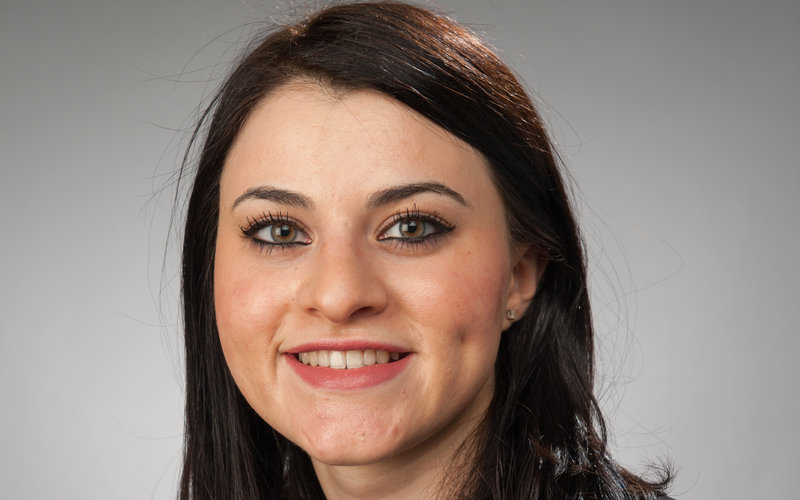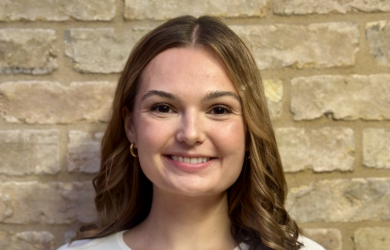
Scholar-elect Natalie Rebeyev talks about her oncology research and being a Bukharian woman studying outside her community.
“When I meet other Bukharian young adults and young professionals, they are amazed that I was able to go away to college - and now to Cambridge.”
Natalie Rebeyev
Natalie Rebeyev is not only the first person to go to university in her family, but, as a Bukharian, she is one of very few women to study outside her local community.
She is keen to use her own experience to open up the possibilities for other women in her community – a Jewish community originating in Central Asia – and has been talking to high school students as part of a health professions programme she coordinated earlier this year, about not only the different roles within the health professions, but trying to communicate to girls her passion for higher education. “Education is very important to the Bukharian community, but many girls don’t want to go away to college as they have not seen many others do it,” she says. “When I meet other Bukharian young adults and young professionals, they are amazed that I was able to go away to college – and now to Cambridge.”
She is determined to start up her own non-profit organisation to give career guidance to young Bukharian girls. “I felt I could not talk to everyone about my own ambitions, especially because many elders in the community had not gone to college. I want to help girls by providing face to face advice, guiding them with regard to where to obtain the financial means to attend school away from home, and hopefully, provide some of that financial and moral support as well,” she says. “I feel the need to give something back to my community.” It is this element of service that drew her towards Gates Cambridge.
Early years
Natalie was born in Queens, New York. Her parents’ families are from Uzbekistan, where Bukharians originate. They met in Israel, but moved to New York for economic reasons just before Natalie was born. Her father is a jeweller and her mother is a medical aesthetician.
Natalie, who has two brothers, knew from an early age that she loved biology and learning about different diseases. At the age of 11, she developed a growth of nerve cells on her tongue, known as a schwannoma, which got her interested in understanding how the body works and how it responds to ailments. Before entering high school, she was accepted on an advanced science programme and set her heart on a career that combined medical and rigorous academic training. “I wanted to bridge the gap between science and medicine. It was a passion I had from a very early age,” she says.
She tried her hand at research and did internships in local hospitals through a Bukharian organisation, the JCCA's Bukharian Teen Lounge. She also did three internships at Beth Israel Medical Centre in Manhattan and recalls being in the operating room at the age of 16 while shadowing a cardiac surgeon. She says: “I got to observe the doctor's bedside manner and see how the doctor-patient relationship works. Surgery seemed like it would be my end goal, but as I did more internships and got more involved in research once I started college, I began to develop a passion for oncology.”
Oncology research
Natalie applied to Syracuse University and attended as a Coronat Scholar where she was a dual Biology and Judaic Studies major. Her mother was extremely supportive of her decision to apply. She had had to give up her nursing career and advanced training to move to the US. She did have to persuade her father a little, but the fact that she got a full scholarship helped.
Early on in her first year she attended a lecture by the Nobel Laureate Dr Aaron Ciechanover on intracellular protein degradation. “I was looking for different ways to get involved with research and when I heard him speak I was intrigued by what he had to say about breakthroughs in oncology,” she says.
She shadowed a doctor who was a radiation oncologist and got a research position at the Cancer Research Institute at Upstate Medical University shortly after hearing that seminar. There she worked on a project on nanotechnology and anti-cancer drug delivery. She also wrote to Dr Ciechanover and asked to do an internship at his laboratory at the Technion – Israel Institute of Technology over the summer of her second year. She was assigned to one of his colleagues who works on fruit fly immunity and its relation to colon cancer. Upon her return, she obtained another position at Upstate Medical University in Dr Richard Wokcikiewicz’s laboratory, where she studied the role played by a protein [erlin2] in intracellular degradation of the IP3 receptor on which she wrote her undergraduate thesis.
Gates Cambridge
The research sparked her desire to do a PhD in Immunology, which she will be pursuing at Cambridge this autumn. “My respective research experiences throughout college clarified for me that I wanted to get an MD and a PhD. Research is fundamental for oncology. But I also want to understand what patients are going through and how we, as scientists and physicians, can help them. As an oncologist, you must be able to understand advancements in science as these are being made constantly,” she says.
She applied for medical training, but was accepted to do the PhD first. She chose Cambridge on the recommendation of Dr Wojcikiewicz. She had also spent the summer of her first year studying comparative health policy in Morocco, Geneva, Spain and Amsterdam, looking at different cultures and doing epidemic work and she says this gave her a taste for living and studying in a different culture.
At Cambridge, she will work with Dr Paul Lehner to identify the genes linked to cystic fibrosis through a novel approach known as CRISPR-mediated genetic screening and she will also learn more about viral pathogenesis. She says: “This work is of great importance because it has the capacity to lead to novel therapeutic benefits.”
She adds that her parents are very proud that she has won the Gates Cambridge Scholarship. “My first year at Syracuse University was a bit strange for all of us, but my parents are used to it now and consider this such a rare opportunity and quite an honour,” she says.
However, if she had not gone to Syracuse University to study, she feels her opportunities would have been much more limited. She would probably have ended up in primary care and would not have the chance to do the kind of research she has done at Syracuse, which instilled in her the desire to obtain an MD/PhD. “That research has been so vital to what I want to do in the future,” she says.












